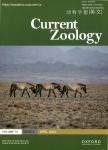Self-deception can evolve under appropriate costs
Self-deception can evolve under appropriate costs作者机构:Department of Computer Science University of Sheffield Sheffield S 1 4DP United Kingdom
出 版 物:《Current Zoology》 (动物学报(英文版))
年 卷 期:2015年第61卷第2期
页 面:382-396页
核心收录:
学科分类:0710[理学-生物学] 12[管理学] 1201[管理学-管理科学与工程(可授管理学、工学学位)] 07[理学] 0905[农学-畜牧学] 0906[农学-兽医学]
主 题:进化 成本 扩展模型 自然选择 决策者 欺骗 动物 偏差
摘 要:Apparent biases in decision making by animals, including humans, seem to present an evolutionary puzzle, since one would expect decisions based on biased (unrealistic) information to be suboptimal. Although cognitive biases are hard to diagnose in real animals (Marshall et al., 2013b), we investigate Trivers’ proposal that individuals should self-deceive first in order to better deceive others (Trivers, 2011). Although this proposal has been scrutinized extensively (Bandura et al., 2011) it has not been formally modelled. We present the first model designed to investigate Trivers’ proposal. We introduce an extension to a recent model of the evolution of self-deception (Johnson and Fowler, 2011). In the extended model individuals make decisions by taking directly into account the benefits and costs of each outcome and by choosing the course of action that can be estimated as the best with the information available. It is shown that in certain circumstances self-deceiving decision-makers are the most evolutionarily successful, even when there is no deception between these. In a further extension of this model individuals additionally exhibit deception biases and Trivers’ premise (that effective deception is less physiologically costly with the aid of self-deception) is incorporated. It is shown that under Trivers’ hypothesis natural selection favors individuals that self-deceive as they deceive others.



